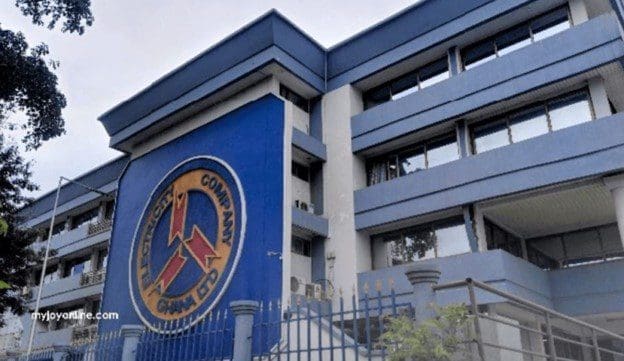
When Rev. John Awuni describes the Electricity Company of Ghana’s tariff proposal as “a subsidy for waste, corruption, and theft,” he’s not just throwing around inflammatory language. He’s distilling into one sentence what many Ghanaians have been thinking as they watch their utility bills climb while power quality remains inconsistent and ECG’s losses continue piling up.
ECG has proposed a 225% increase in its Distribution Service Charge over the 2025 to 2030 tariff period, a move that would dramatically reshape household budgets and business operating costs across Ghana. For context, that’s asking consumers to more than triple what they currently pay for electricity distribution, ostensibly to cover costs and improve service.
Rev. Awuni, who chairs the Food and Beverages Association of Ghana (FABAG), isn’t buying it. He’s warned that such hikes would cripple local industries and burden households already grappling with high costs, and he’s marshaling arguments that go beyond simple opposition to higher prices.
His petition to President John Dramani Mahama argues something more fundamental: that approving tariff increases without fixing ECG’s structural problems would punish citizens for the company’s failures. It’s one thing to pay more for better service. It’s another to subsidize inefficiency with no guarantee anything will improve.
The frustration isn’t abstract. For tailors, welders, cold store operators and barbers, electricity costs represent a significant portion of operating expenses. When tariffs jump, these businesses face impossible choices: absorb the costs and watch profits evaporate, raise prices and risk losing customers, or reduce operations and lay off workers. None of these options support economic growth.
The 2024 Auditor General’s report flagged ECG for multi billion cedi financial discrepancies and poor accountability systems, with allegations of conflict of interest situations where engineers and staff awarded inflated contracts. These aren’t vague accusations; they’re documented findings from Ghana’s official financial watchdog.
ECG’s technical and commercial losses have been a persistent problem for years. Power gets generated, distributed through the grid, and somehow disappears before it can be billed or collected. Some of this represents genuine technical losses inherent in any electrical system. Much of it doesn’t. Illegal connections, meter tampering, billing errors and simple theft drain revenue that should cover operational costs.
Then there’s the compensation question. Rev. Awuni stated that any tariff hikes without reforms would mean Ghanaians would be forced to subsidise inefficiency, theft and corruption, pointing to staff benefits and remuneration packages that reportedly exceed those at comparable state enterprises. When a company hemorrhaging money maintains generous compensation structures, it raises questions about priorities.
His petition doesn’t simply oppose the tariff increase. Instead, it proposes conditional approval: let ECG demonstrate measurable efficiency improvements, financial transparency and cost rationalization first, then discuss what consumers should reasonably pay. It’s the difference between rewarding effort and rewarding outcomes.
At a press conference in Accra, Rev. Awuni called on President Mahama to initiate comprehensive reforms at ECG before any new tariff adjustments are approved, noting that electricity costs had reached unsustainable levels. The timing matters because the Public Utilities Regulatory Commission is preparing to deliberate on ECG’s proposal, making this a moment when public pressure might actually influence policy.
The broader economic implications extend beyond individual utility bills. High electricity costs make Ghanaian manufacturers less competitive regionally and internationally. Companies that might invest in Ghana look at power reliability and pricing when deciding where to locate facilities. Every percentage point added to electricity tariffs shifts these calculations against Ghana’s favor.
Rev. Awuni’s argument contains an interesting assertion: if ECG operated efficiently, tariffs might actually decrease rather than increase. That’s a testable claim. Reduce losses, eliminate corruption, rationalize costs, improve collection rates, and see whether the resulting financial position supports lower consumer prices. If it doesn’t, then perhaps the current tariff structure genuinely can’t support operations. If it does, then consumers have been overpaying to finance mismanagement.
The petition presents what amounts to a test for Ghana’s governance approach. Does leadership protect consumers and demand accountability from state enterprises, or does it default to raising prices whenever public companies claim financial distress? The answer reveals priorities.
For ordinary Ghanaians already navigating economic uncertainty, higher transportation costs, and inflated prices for basic goods, another major utility increase feels less like cost recovery and more like accumulated failures being passed down to those least able to bear them. That’s the moral dimension Rev. Awuni references: it’s wrong economically, but it’s also wrong ethically to ask citizens to finance negligence.
Ghana’s power sector has visited this crossroads before. Previous tariff increases came with promises of improvement. Service quality remains inconsistent, losses persist, and here comes another request for more money. Maybe this time is different. Maybe ECG has genuinely turned a corner and needs this increase to finalize reforms already underway. But given the track record, skepticism isn’t cynicism; it’s pattern recognition.
FABAG is petitioning President Mahama to launch a Presidential Executive Reform Agenda for ECG, anchored by clear, measurable Key Performance Indicators and overseen by a dedicated Presidential Task Force. That’s a concrete proposal that would establish accountability mechanisms and make reform measurable rather than aspirational.
Whether the government embraces this approach or approves the tariff increase without preconditions will signal how seriously it takes the reform agenda. For Rev. Awuni and the businesses he represents, the question isn’t really about electricity prices. It’s about whether Ghana’s institutions can be fixed or whether citizens will continue paying premium prices for substandard service while corruption and inefficiency eat whatever revenue comes through the door.
The answer should be clear by the time PURC makes its decision. Either reform comes first and tariffs follow results, or tariffs come first and reform remains perpetually just around the corner. Ghanaians have lived through enough cycles to know which pattern usually wins.
